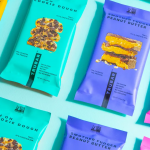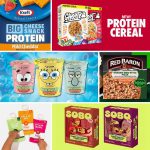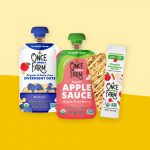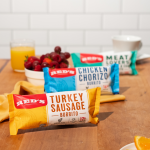Expo West 2022 Reporters Notebook: Expo Serves Better-for-you Takes on Indulgent Snacks; Following Perfect Keto Acquisition, Superfat Expands Assortment

First View: Expo Serves Better-for-you Takes on Indulgent Snacks
The Fresh Ideas Organic Marketplace may be synonymous with fresh takes on plant-based products if this year’s exhibitors were any indication of the category’s trajectory. Under the tent this afternoon we saw a wide range of brands exhibiting new better-for-you sweets that have removed dairy and highlighted sustainability claims in tandem with health attributes.
From Petite Pot’s new vegan-friendly puddings, TCHO’s six SKU, sustainably sourced, non-dairy chocolate line and Eat the Change’s vegetable-filled take on fruit snacks, many of the latest plant-based products have positioned themselves at an intersection of two prominent consumer interests – better-for-the-planet and better-for-you – while continuing to maintain a focus on indulgence.
While all fall under the shade of the organic umbrella, callouts for upcycled and sustainably sourced ingredients were prominent among new launches. These newer claims, specifically in the realm of sustainable sourcing, took on a variety of looks from the recently launched Land-to-Market regenerative seal to updated packaging that links the consumer’s to the product’s origin and takes them through its supply chain, via QR code.
Over in the North Hall, better-for-you sweet snacks were also plentiful and date-forward options and sweeteners popped up in a variety of places and products. In this mix is Joolies latest line extension: a new chocolate covered date line dubbed “Jooliettes.” The bite-sized dates are positioning themselves firmly in the snack category with on-the-go packs offering a single-serve sweet tooth cure in timely flavors including Matcha and Blood Orange.
Plant-based cookie dough bite maker BetterBites also pursued a more portion-controlled format for its sunflower butter-based treats. The brand now offers its cookie dough bites in a grab and go two-bite pack format, previously the product was available in 6-packs and primarily sold in club stores. The small pack also lends itself to more checkout line impulses than the bulk format, said a BetterBite spokesperson.
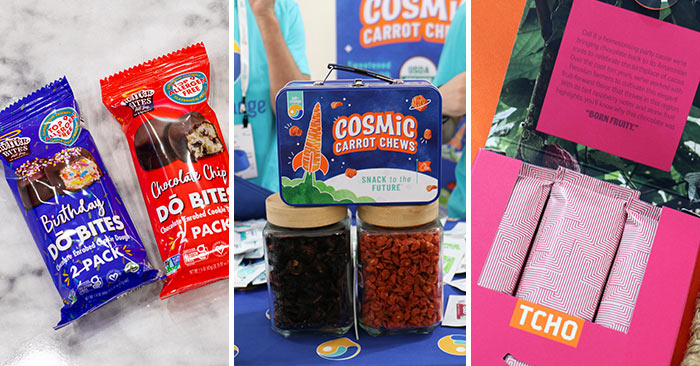
Following Perfect Keto Acquisition, Superfat Expands Assortment
While some trends such as jerky and CBD enhanced food items seem to have settled down this year, the keto trend has managed to withstand pandemic pressures, maintaining a significant presence at the show. Though originally contained largely to the bar set, some keto brands are looking to make moves throughout the store.
Keto nut butter brand Superfat last year acquired Perfect Keto and now uses this moniker as their main branding identity. At the show, they debuted new keto cereals and mac and cheese to compliment the keto rice crispy-like treats they launched last year. The mac and cheese is particularly unique, using lupin flour and soluble tapioca flour to drive fiber up to 20 grams per serving and dropping net carbs to only 6 grams per serving.
“I think it’s a natural progression over time to move into other categories and different earring occasions, rather than just on the go snacks,” David Hauser, Chairman of the Board for Perfect Keto (and the founder of Superfat) said.
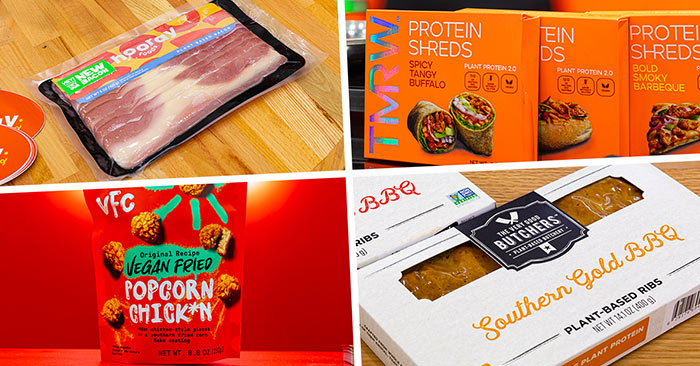
Plant-Based Proteins Looks To Fill Ready-to-Eat Gap
As plant-based protein has expanded, some brands are looking beyond established formats like burgers and ground meat as they look to develop more specific use occasions and product formats. During the show on Wednesday, we saw a range of new and differently positioned meat-alternatives including BBQ-coated ribs, “dusted” scallops, ground pork, golden fish filets and bacon.
In addition to formats, many plant-based protein exhibitors presented products that extended beyond the usual burgers and nuggets and into a wide range of ready-to-eat and heat lines.
While its seafood line, which recently launched in the U.S. at Whole Foods and Sprouts, was OmniFoods’ main draw, the Asian-inspired plant-based food brand also sampled its frozen, ready-to-heat dumpling line made with its flagship pork ingredient. Hemp-filled taquitos and popcorn chick*n are just a few of the other new innovations spotted among the sea of alternative-protein products and signal a shift among plant-based products starting to better reflect global flavors.
Sustainable supply chains, responsible sourcing and regenerative ingredients were also generating plenty of buzz. Aside from sweets, sauces and dips displayed saw plenty of ingredient-forward innovation. Good Food For Good debuted its plant-based take on Bolognese which included Classic, Creamy and Spicy varieties “powered by seeds” and aiming to revitalize the pasta sauce aisle with its colorful packaging.
Attendees Enjoy Fading COVID Regulation
As the Omicron wave of the COVID-19 pandemic fades quickly and masking policies have or are scheduled to be dropped in all 50 states, it was clear that the Expo West official masking and sampling policies put up to curtail infection were running into a generally looser approach taken by the attendee population. That left enforcement of pre-announced sampling policies something of an item of confusion for some brands.
Last year event organizer New Hope announced that not only would proof of vaccination or a negative COVID-19 test would be required to attend Expo West, but that attendees would also need to “stop and sample,” only removing their masks when trying a product. At the time, these rules were in line with the state and county’s ordinance. Despite those regulations having been unwound in recent weeks, with masks no longer required indoors, New Hope announced it planned to still require masks — even printing and displaying signs around the trade show campus.
The crowd — perhaps energized by the 60,000-person plus combination reunion and chow line Wednesday — had different ideas, and at least in the North Hall, immediately after opening, masks were the exception rather than the rule.
For some brands, the laxity around attendee masking lay in contrast to the pre-announced policies around sampling, where brands had been advised to bring pre-packed single serve samples. For “open samples” that demand preparation, requirements included gloves, a facemask and a hairnet, a sneeze guard or food cover; and hand washing and sanitation kits. The shift in orthodoxy led to frustration at a few booths, where the cost of preparation — and inconvenience of toeing the line — contrasted with the loosening of crowd behavior amidst the recession of the Omicron wave. In other words, there weren’t a lot of hairnets or facemasks to be found.
Upon Return, Expo West Confronts Climate Challenges
It was back to business at Expo West after a two-year COVID-19 enforced layoff. Before the booths opened on Wednesday, attendees found themselves wrestling with two themes during much of the “pregame” programming — opportunity and urgency.
Urgency was reflected in both Tuesday’s traditional Climate Day event — something embodied by Rev. Lennox Yearwood Jr., founder and president of the Hip-Hop Caucus, an architect of P-Diddy’s “Vote or Die” movement and a longtime social justice activist, who reflected on the extreme weather conditions brought on by Hurricane Katrina in 2005 and the upheaval in that disaster that was concentrated on the largely Black population of New Orleans as a disaster that created “climate refugees in our own country.”
Yearwood went on to draw a line from those events to those taking place in the ongoing invasion of Ukraine by Russian forces. The upshot: the same ethos that has created climate change is battling for the increasingly scarce resources that continue to amplify climate change.
To the good, however, there’s opportunity: the growth of a natural products industry, alternative energy, and more important, the energy of the youth who are increasingly terrified and disappointed by the inaction of previous generations. As a legacy for those to come, Yearwood urged, look at where the attendees might be able to contribute to an audience 100 years from now, and think about what they might do to improve environmental outcomes.
Wednesday’s opening convocation stressed that opportunity, while acknowledging the challenging forces that have continued to plow the way for natural, organic, and better-for-you products.
The audience gave a wildly enthusiastic welcome to a touchpoint event that has returned after two years. In a tripartite presentation, New Hope Prexy Carlotta Mast, SPINS EVP Kathryn Peters and Whipstitch Managing Director Nick McCoy laid out the burgeoning sector’s economic status while folding in renewed interest in diversity, the environment, COVID, and the current crisis in the Ukraine.
As part of the intro, Mast announced that New Hope was making a $100,000 donation to Jose Andreas’ chef’s collaborative, which has been providing meals to Ukrainian refugees during the Russian onslaught.
Back to enthusiasm: with so many Americans looking at their health, looking at immunity, the Natural & Organic universe is going to hit $400 billion by 2030, Mast announced. The industry is filling out in all the right places, Peters noted, hitting about 25% of CPG, — but providing 68 % of the overall CPG industry’s growth. Food and Beverage are about 70 percent of that category total.
Adversity is creating opportunity, as well, McCoy pointed out: even the much hyped inflation that’s been an issue in 2022 hasn’t fallen on smaller brands, health-and-wellness focused companies quite as hard. The 7% inflation rate has been matched by 7% pricing growth for brands in the SPINS database, he noted, but that growth is highly over-indexed by the big brands. Health and wellness brands, he said, have raised their prices around 5%, leaving room for them to also take price increases to keep up, making for fatter overall margins.
But to keep those returns growing, all three speakers again echoed the challenge expressed the day before: companies with diverse leadership are outperforming those that skew less diverse, McCoy noted, and products that are part of movements like organic and now regenerative agriculture are growing ahead of conventional. In the face of environmental disaster and years of unequal wealth distribution, the speakers seemed to be saying, the stakes are high, but the crisis is also the opportunity.


